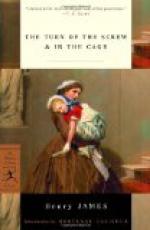Ah this was the old story. “But how soon?”
“Why almost any day. Of course,” Mrs. Jordan honestly added, “they’re nearly always out.”
“Then why do they want flowers all over?”
“Oh that doesn’t make any difference.” Mrs. Jordan was not philosophic; she was just evidently determined it shouldn’t make any. “They’re awfully interested in my ideas, and it’s inevitable they should meet me over them.”
Her interlocutress was sturdy enough. “What do you call your ideas?”
Mrs. Jordan’s reply was fine. “If you were to see me some day with a thousand tulips you’d discover.”
“A thousand?”—the girl gaped at such a revelation of the scale of it; she felt for the instant fairly planted out. “Well, but if in fact they never do meet you?” she none the less pessimistically insisted.
“Never? They often do—and evidently quite on purpose. We have grand long talks.”
There was something in our young lady that could still stay her from asking for a personal description of these apparitions; that showed too starved a state. But while she considered she took in afresh the whole of the clergyman’s widow. Mrs. Jordan couldn’t help her teeth, and her sleeves were a distinct rise in the world. A thousand tulips at a shilling clearly took one further than a thousand words at a penny; and the betrothed of Mr. Mudge, in whom the sense of the race for life was always acute, found herself wondering, with a twinge of her easy jealousy, if it mightn’t after all then, for her also, be better—better than where she was—to follow some such scent. Where she was was where Mr. Buckton’s elbow could freely enter her right side and the counter-clerk’s breathing—he had something the matter with his nose—pervade her left ear. It was something to fill an office under Government, and she knew but too well there were places commoner still than Cocker’s; but it needed no great range of taste to bring home to her the picture of servitude and promiscuity she couldn’t but offer to the eye of comparative freedom. She was so boxed up with her young men, and anything like a margin so absent, that it needed more art than she should ever possess to pretend in the least to compass, with any one in the nature of an acquaintance—say with Mrs. Jordan herself, flying in, as it might happen, to wire sympathetically to Mrs. Bubb—an approach to a relation of elegant privacy. She remembered the day when Mrs. Jordan had, in fact, by the greatest chance, come in with fifty-three words for Lord Rye and a five-pound note to change. This had been the dramatic manner of their reunion—their mutual recognition was so great an event. The girl could at first only see her from the waist up, besides making but little of her long telegram to his lordship. It was a strange whirligig that had converted the clergyman’s widow into such a specimen of the class that went beyond the sixpence.




